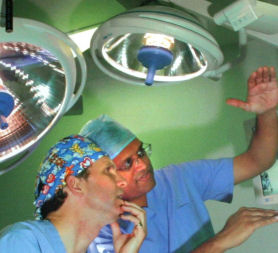Cameron aims for public services reform legacy
Prime Minister David Cameron says the “fundamental reform” planned for the NHS is part of a complete modernisation of public services across the country.
The Prime Minister used a speech today to set out his passion for reforming the public sector, and the need for urgency. He told an audience in London: “We should not put this off any longer.”
He said that he wants the “complete modernisation of our public services” to be one of the legacies of his Government.
In two days, the Coalition will publish a Bill covering one element of its reform agenda, the NHS. The Health and Social Care Bill aims to hand power back to GPs and away from managers, and represents a major shake-up.
However the Royal College of Surgeons warned today that budget cuts would force the NHS on a “dangerous path”. President John Black told The Guardian newspaper that the “backdoor rationing” of non-urgent operations would lead to patients suffering unnecessary pain and long-term health problems.
And the Royal College of Nursing joined other health unions in expressing concerns about the Bill in a letter to the Times. The RCN’s Chief Executive, Peter Carter, told Channel 4 News that the NHS was undergoing its biggest reorganisation in its 62-year history at the same time as being required to save between £15billion and £20bn in the next four years.
“Either of these issues would have been big on its own,” he said. “Put the two together and you have a potential recipe for seriously destabilising the NHS.”
FactCheck: Are we as unhealthy as the Victorians?
Passion
But David Cameron said that the reforms are not being led by spending cuts. He stressed that, even after the £81bn cuts are implemented, spending on public services will still account for 41 per cent of national income – the same level as 2006.
Every year without improving our schools is another year of children let down, another year our health outcomes lag behind the rest of Europe, another year that trust and confidence in law and order erodes. Prime Minister David Cameron
He said that, at £5,000 per pupil, spending on education will be the same as in Germany and more than in France; London will have as many police officers as New York; and health spending will match the European average.
“It’s just not true to say the spending taps are being turned off,” Mr Cameron said.
“The money will be there and we will spend it wisely.”
The Prime Minister stressed his personal and political reasons for modernising public services, including introducing directly-elected police commissioners and allowing every school in England to take on self-governing academy status as well as setting up “free schools”.

He said: “Personal because I’ve experienced, first-hand, how dedicated, how professional, how compassionate our best public servants are.
“The doctors who cared for my eldest son, the maternity nurses who welcomed my youngest daughter into the world, the teachers who are currently inspiring my children, all of them have touched my life, and the life of my family, in an extraordinary way and I want to do right by them.
“And this is a political passion – and priority – of mine too. I believe that Britain can be one of the great success stories of the new decade.”
Critics
Mr Cameron also hit back at critics of some of the reforms, revealing that 141 GP groups have already come forward to take on new commissioning powers ahead of their introduction in 2013.
There is no time to lose to improve Britain’s public services, he said.
“Every year we delay, every year without improving our schools is another year of children let down, another year our health outcomes lag behind the rest of Europe, another year that trust and confidence in law and order erodes.
“These reforms aren’t about theory or ideology – they are about people’s lives.
“Your lives, the lives of the people you and I care most about – our children, our families and our friends. So I have to say to people: if not now, then when? We should not put this off any longer.”
Questioned
Penny Young, the Chief Executive of the National Centre for Social Research, asked the Prime Minister how he would respond if public attitudes towards the NHS suffered as a result of the reforms.
The centre’s Social Attitudes survey showed that satisfaction levels with the NHS have almost doubled in the UK in the last decade.
Mr Cameron said: “I think the public do think the NHS does a good job…but I think as a Government you have a duty to ask yourself: are we getting, for what we put in, everything that we ought to be getting out?
“We’re putting in European levels of spending but if you compare our cancer survival rates, stroke survival, heart attack, we’re not doing as well. So I think we have a duty to the taxpayer to think how can we improve that?”
-
Latest news
-
Taylor Swift’s new break-up album breaks records3m

-
NHS trust fined £200K for failings that led to death of two mental health patients3m

-
Sunak vows to end UK ‘sick note culture’ with benefit reform3m

-
‘Loose talk about using nuclear weapons is irresponsible and unacceptable’, says head of UN’s nuclear watchdog3m

-
‘There wasn’t an Israeli attack on Iran,’ says former adviser to Iran’s nuclear negotiations team7m

-




